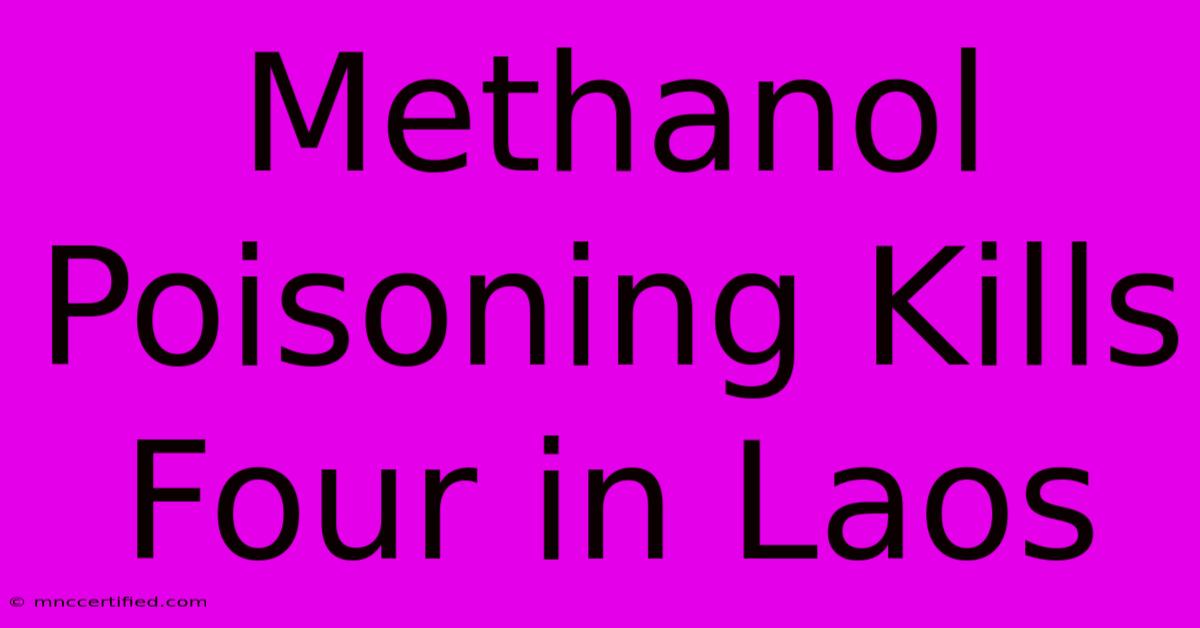Methanol Poisoning Kills Four In Laos

Table of Contents
Methanol Poisoning Kills Four in Laos: A Tragic Reminder of a Preventable Crisis
Four lives tragically lost in Laos due to methanol poisoning underscore a critical public health issue that demands immediate attention. This incident serves as a stark reminder of the dangers of consuming unregulated alcohol and the need for stronger preventative measures. This article delves into the specifics of the Laotian tragedy, explores the dangers of methanol poisoning, and outlines steps that can be taken to prevent future occurrences.
The Laos Tragedy: A Devastating Loss
Reports from Laos indicate that four individuals succumbed to methanol poisoning after consuming contaminated alcohol. While the exact source of the contamination remains under investigation, the incident highlights the pervasive problem of unregulated alcohol production and distribution in many parts of the world, including Southeast Asia. This is not an isolated incident; similar tragedies occur regularly, often in underserved communities with limited access to safe and regulated alcohol.
The Immediate and Long-Term Effects of Methanol Poisoning
Methanol, also known as methyl alcohol or wood alcohol, is a highly toxic substance. Unlike ethanol (the type of alcohol found in alcoholic beverages), methanol is not metabolized safely by the body. When ingested, it is converted into formaldehyde and formic acid, which can severely damage vital organs, particularly the eyes, nervous system, and kidneys.
Symptoms of methanol poisoning can range from mild to severe and may include:
- Nausea and vomiting
- Headache
- Blurred vision
- Abdominal pain
- Dizziness
- Seizures
- Respiratory failure
- Permanent blindness
- Death
The severity of the effects depends on the amount of methanol ingested and the individual's health. Even small amounts can cause significant harm, and delayed treatment can lead to irreversible damage or death.
Preventing Methanol Poisoning: A Multi-pronged Approach
Preventing methanol poisoning requires a multi-faceted approach involving government regulation, public awareness campaigns, and responsible consumption practices.
Strengthening Regulations and Enforcement: A Government Responsibility
Governments play a crucial role in preventing methanol poisoning by:
- Strictly regulating the production and distribution of alcohol: This includes licensing distilleries, ensuring quality control, and implementing robust testing procedures to detect methanol contamination.
- Increasing penalties for producers and distributors of contaminated alcohol: Severe consequences deter unsafe practices.
- Raising public awareness: Educating the public about the dangers of methanol poisoning and how to identify safe alcohol sources.
- Supporting research and development: Investing in technology to improve detection methods and treatment options.
Public Awareness: The Power of Education
Effective public awareness campaigns are crucial. Educational materials should be readily accessible and easily understandable, targeting vulnerable populations most at risk. This includes:
- Clear labeling requirements on alcoholic beverages: This helps consumers make informed choices and identify legitimate products.
- Public service announcements (PSAs): These can effectively communicate the risks associated with consuming unregulated alcohol.
- Community outreach programs: Engaging local leaders and community health workers to educate people in vulnerable communities.
Responsible Consumption: Personal Responsibility
While government regulation is essential, individual responsibility plays a vital role in preventing methanol poisoning.
- Only consume alcohol from reputable sources: Avoid purchasing alcohol from unknown or unregulated sellers.
- Check labels carefully: Ensure that the alcohol is labelled correctly and meets safety standards.
- Be aware of symptoms: Seek immediate medical attention if you experience any symptoms of methanol poisoning.
Conclusion: A Call for Action
The tragic loss of life in Laos due to methanol poisoning serves as a somber reminder of the devastating consequences of consuming unregulated alcohol. Preventing future tragedies requires a concerted effort from governments, health organizations, and individuals alike. By strengthening regulations, enhancing public awareness, and promoting responsible consumption, we can significantly reduce the risk of methanol poisoning and safeguard public health. This is not merely a matter of public health; it's a matter of human life. Let this tragedy serve as a catalyst for change.
Keywords: Methanol poisoning, Laos, alcohol poisoning, public health, safety, regulation, prevention, contaminated alcohol, methyl alcohol, wood alcohol, formaldehyde, formic acid, symptoms, treatment, public awareness, government responsibility, responsible consumption, Southeast Asia.

Thank you for visiting our website wich cover about Methanol Poisoning Kills Four In Laos. We hope the information provided has been useful to you. Feel free to contact us if you have any questions or need further assistance. See you next time and dont miss to bookmark.
Featured Posts
-
38 47 An Hour Is How Much A Year
Nov 21, 2024
-
Riley Nursing Murder Ibarras Conviction
Nov 21, 2024
-
Jet Ski Rental Company Insurance
Nov 21, 2024
-
When Cyclones Meet Rivers Weather Results
Nov 21, 2024
-
Mobile Home Insurance In Alabama
Nov 21, 2024